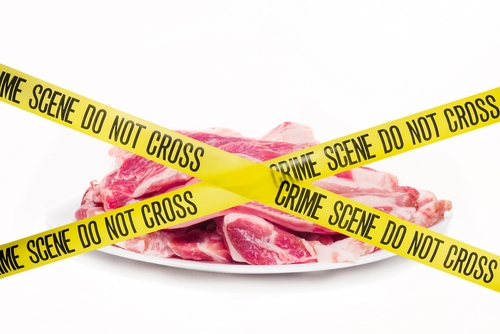
Many in academia and the media in the UK place much of the blame for food fraud on large, nefarious and organised gangs that are external to the industry, but this ignores the role of those within the food and drinks business who can also perpetrate high levels of fraud.
So says a new report that aims to highlight the role that "legitimate occupational actors," ie those that work in the food industry such as the supply chain and other areas, can have in food fraud.
In the report, coming out of the Centre for Criminology and Criminal Justice at the University of Manchester, the authors say: "We argue that food fraud, rather than being an 'exogenous' phenomenon perpetrated by externally organised (transnational) 'criminal enterprise', is better understood as an 'endogenous' phenomenon within the food system where legitimate occupational actors and organisations are in some way necessarily involved."
It says that, rather than being related solely to organised crime, those from within can become criminals themselves, typically arising as a result of "conducive conditions" that stem from normal industry practices, ie where is there is a lax culture than can allow these occupational actors to "make the most of" a criminal opportunity.
This has the effect of hiding the scale of internal food fraud within legitimate markets, and the prescription of gangs being the main perpetrators is detracting from the threat of internal workers and processes.
The report's authors give an example of this from the soft drinks industry in Europe, looking at one case that involved the tampering of best before dates (BBDs) on a popular sports drink.
Here, in the so-called 'sporty pop case', the authors note that margins are tight and the market volatile, something that may have prompted the fraud. The case found a batch of sporty pop (the name and manufacturer have not been released) being sold by small retailers and companies in Europe, where the BBDs had been changed to given them a longer shelf life.
It turns out that this has started early on in the chain and went through a series of companies and processes. What came to light was that there was no "guardianship" over who had final responsible for this soft drink, and so controls were low, meaning that those who tampered with the BBDs were operating at a low risk of getting caught, with few to no major repercussions if they did in fact get caught.
For this market, profit only comes when large volume is bought and sold, so extending the BBDs allows longer selling life, and therefore better chances of making money. The authors also note that there were huge volumes of this drink being sold, but then little to no oversight to what happens when it is on shelves.
It said that in this case had all the elements of internal fraud: "These are legitimate actors within the market, many of whom conduct a legitimate business, a few who may knowingly cooperate and collude with other market actors to distribute tampered products and some who may unwittingly be used to do so."
Food fraud can include a broad variety of issues that include faked or counterfeit wines and spirits (cheaper booze being re-bottled as much more expensive versions), to consumer oils, meats (such as the horsemeat scandal) and sea food. Typically, fraud in this context relates to mislabelled packaging on certain foods and drinks, with a deliberate attempt to sell a product under a brand or list of ingredients that is not contained within the actual product as sold.
This is usually made for financial gain, but can also pose a threat to those with allergies who will not know what they are consuming.
In the report's context, the authors say there are three main areas of fraud that relate to a deliberate attempt from the start to defraud consumers; an "intermediate fraud" that sees a company or section of the industry start out obeying the law, but consciously turn to fraud later on; and the third type, the "slippery slope fraud," where deception spirals, usually as a result of trying to keep a business going or staving off bankruptcy.
The report wants to broaden the use of them terminology of food fraud to better encapsulate the potential for its endogenous roots and behaviour.
The report says that the term should become: The 'Organisation of Food Fraud', not 'Organised Crime and Food Fraud," in order to denote the problems and criminal opportunities inherent within the industry.
©
SecuringIndustry.com





